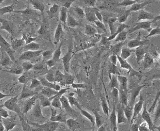Cerebral Vascular Smooth Muscle Cells (CVSMC)
Brain Vascular Smooth Muscle Cells

Vascular smooth muscle refers to the particular type of smooth muscle found within, and composing the majority of the wall of blood vessels. Vascular smooth muscle contracts or relaxes to change both the volume of blood vessels and the local blood pressure, a mechanism that is responsible for the redistribution of the blood within the body to areas where it is needed. Thus the main function of vascular smooth muscle tone is to regulate the caliber of the blood vessels in the body. Excessive vasoconstriction leads to high blood pressure, while excessive vasodilation as in shock leads to low blood pressure. VSMC express the cell adhesion molecules ICAM-1 and VCAM-1 and studies have suggested that these molecules may promote VSMC proliferation, differentiation, and vascular inflammation. Cerebral Vascular smooth muscle cells (CVSMC) are isolated from brain tissue. They play a critical role in the continuous advancement of therapies for vascular disease.
Organism species: Homo sapiens (Human)
- Cell CSI039Hu01 Primary Human Cerebral Vascular Smooth Muscle Cells (CVSMC) In Stock
- Customized Service n/a Extract of Cerebral Vascular Smooth Muscle Cells (CVSMC) Total Protein/DNA/RNA Extract Customized Service Offer
- Customized Service n/a Medium for Cerebral Vascular Smooth Muscle Cells (CVSMC) (If Necessary) Cell Culture Medium Customized Service Offer
Organism species: Mus musculus (Mouse)
- Cell CSI039Mu01 Primary Mouse Cerebral Vascular Smooth Muscle Cells (CVSMC) In Stock
- Customized Service n/a Extract of Cerebral Vascular Smooth Muscle Cells (CVSMC) Total Protein/DNA/RNA Extract Customized Service Offer
- Customized Service n/a Medium for Cerebral Vascular Smooth Muscle Cells (CVSMC) (If Necessary) Cell Culture Medium Customized Service Offer
Organism species: Rattus norvegicus (Rat)
- Cell CSI039Ra01 Primary Rat Cerebral Vascular Smooth Muscle Cells (CVSMC) In Stock
- Customized Service n/a Extract of Cerebral Vascular Smooth Muscle Cells (CVSMC) Total Protein/DNA/RNA Extract Customized Service Offer
- Customized Service n/a Medium for Cerebral Vascular Smooth Muscle Cells (CVSMC) (If Necessary) Cell Culture Medium Customized Service Offer
Organism species: Oryctolagus cuniculus (Rabbit)
- Cell CSI039Rb01 Primary Rabbit Cerebral Vascular Smooth Muscle Cells (CVSMC) In Stock
- Customized Service n/a Extract of Cerebral Vascular Smooth Muscle Cells (CVSMC) Total Protein/DNA/RNA Extract Customized Service Offer
- Customized Service n/a Medium for Cerebral Vascular Smooth Muscle Cells (CVSMC) (If Necessary) Cell Culture Medium Customized Service Offer
Organism species: Canis familiaris; Canine (Dog)
- Cell CSI039Ca01 Primary Canine Cerebral Vascular Smooth Muscle Cells (CVSMC) In Stock
- Customized Service n/a Extract of Cerebral Vascular Smooth Muscle Cells (CVSMC) Total Protein/DNA/RNA Extract Customized Service Offer
- Customized Service n/a Medium for Cerebral Vascular Smooth Muscle Cells (CVSMC) (If Necessary) Cell Culture Medium Customized Service Offer


